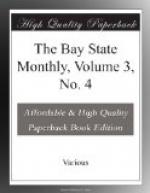Tidings of these preparations was carried to the British in Boston by the spies and tories who abounded in the town, and on the evening of the eighteenth of April, an expedition consisting of about eight hundred men was sent out to counteract them. Paul Revere having been stopped at Lexington, was able to spread the news of the attack by means of Dr. Prescott who had been sitting up late with the lady whom he afterwards married. Love overleaps all obstacles, and with cut bridle-rein the Doctor leaped his gallant steed over walls and fences and reached Concord very early in the morning. At the ringing of the bell the Minute-men flocked to their standard on the crest of Burying Hill where they were joined by Rev. William Emerson, whose marble tomb stands near the very spot, and also marks the place where Pitcairn and Smith controlled the operations of the British during the forenoon.
The Liberty-pole occupied the next eminence, a few rods farther east. Here the little band of patriots awaited the coming of the well-disciplined foe, ignorant that their country-men had fallen on Lexington Common before the very muskets that now glittered in the morning sun. Some proposed to go and meet the British, and some to die holding their ground; but their wiser commanders led them to Ponkawtassett Hill a mile away, where the worn and weary troops were cheered by food and rest, and were reinforced by new arrivals from Acton and other towns, until they numbered nearly three hundred men. After destroying many stores in the village, and sending three companies to Colonel Barrett’s in vain search for the cannon, which were buried in the furrows of a ploughed field, a detachment of British soldiers took possession of the South Bridge, and three companies were left to guard the old North Bridge under command of Captain Lawrie.
[Illustration: Henry D. Thoreau.]
Seeing this manoeuvre the Americans slowly advanced and took up their position on the hill at the west of the bridge which the British now began to destroy. Colonel Isaac Davis of Acton now offered to lead the attack, saying, “I have not a man who is afraid to go,” and he was given the place in front of the advancing column, and fell at the first volley from the British, who were posted on the other bank of the river. Major Buttrick then ordered his troops to fire, and dashed on to the bridge, driving the enemy back to the main road, down which they soon retreated to the Common, to join the Grenadiers and Marines who there awaited them. The Minute-men crossed over the hills and fields to Merriam’s corner when they again attacked the British, who were marching back to Boston, and killed and wounded several of the enemy without injury to themselves. Meanwhile the three companies had returned from Colonel Barrett’s and marched safely over the bridge which had been abandoned by both sides, and joined the main force of the British who had waited for them on the Common.




